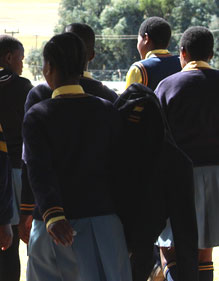
Dear Corruption Watch
My daughter's best friend's teacher wants her to perform a sexual favour in exchange for good marks. She is terrified both of "paying the bribe" and telling her parents or the headmaster about this abuse of power. What are her rights and what recourse does she have to fight this vile corruption?
Outraged
Dear Outraged
Your daughter's best friend has a right to be treated by her teachers in a manner that respects her dignity and her constitutional rights.
The guidelines promulgated under the South African Schools Act for the consideration by governing bodies when adopting a code of conduct for pupils say pupils can expect teachers to maintain a high standard of professional ethics, be present to teach their classes, assist them with their learning difficulties, report on their progress and look after their wellbeing.
There should be a relationship of mutual trust and respect between pupils and teachers. Victimisation of the one by the other is unacceptable.
The code of professional ethics that binds teachers requires them to refrain from improper physical contact with pupils, any form of sexual harassment of pupils and any form of a sexual relationship with pupils.
The Employment of Educators Act classifies the conduct of your daughter's best friend's teacher as serious misconduct. In terms of section 17(1) of the act, a teacher must be dismissed if he or she is found guilty of an act of corruption in regard to examinations or promotional reports, committing an act of sexual assault on a pupil or having a sexual relationship with a pupil of the school where he is employed.
It also qualifies as serious misconduct on the part of a teacher if he causes a pupil to do any of these acts.
If it is alleged, as in the case with your daughter's best friend, that her teacher wants her to perform a sexual favour in exchange for good marks, this conduct is a contravention of the teachers' professional ethics code and the Employment of Educators Act.
Section 17(2) of the act requires that when such allegations are made against a teacher, his employer – the head of the department of education in that province – must institute disciplinary proceedings in accordance with the disciplinary code and procedures that appear in schedule 2 of the Act.
Your daughter's best friend will have to report the abuse, although her being terrified is understandable in the circumstances. The incident must be reported to the school principal so that the investigations and disciplinary procedures contemplated in schedule 2 can begin.
In dealing with the matter, the pupil is entitled to the protection of her privacy from the school, and to have the matter dealt with confidentially.
Her parents will inevitably be informed because the teachers' professional ethics code obliges the school principal to do what is practically possible to keep parents adequately and timeously informed about the wellbeing and progress of their children. She will need their support.
The teacher's conduct is also problematic under corruption statutes such as the Prevention and Combating of Corrupt Activities Act, in terms of which it may constitute corruption or a corrupt activity. This must be regarded as a criminal activity and reported to the police.
Do you face an ethical dilemma? Do you suspect corruption? If you need help to resolve such issues, write to the Corruption Watch experts at letters@businesstimes.co.za. Mark your letter ‘Dear Corruption Watch’.
• This article was first published in Sunday Times: Business Times

